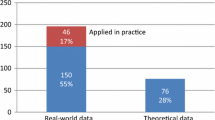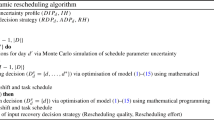Abstract
The current paper uses a scenario from logistics to show that solution approaches based on metaheuristics, and in particular particle swarm optimization (PSO) can significantly add to the improvement of staff scheduling in practice. Sub-daily planning, which is the focus of our research offers considerable productivity reserves for companies but also creates complex challenges for the planning software. Modifications of the traditional PSO method are required for a successful application to scheduling software. Results are compared to different variants of the evolution strategy (ES). Both metaheuristics significantly outperform manual planning, with PSO delivering the best overall results.


Similar content being viewed by others
References
ATOSS Software AG, Heidelberg FH (eds) (2006) Standort Deutschland 2006. Zukunftssicherung durch intelligentes Personalmanagement, München
Bäck T (1996) Evolutionary algorithms in theory and practice. Oxford University Press, London
Bäck T, Fogel DB, Michalewicz Z (eds) (1997) Handbook of evolutionary computation. Institute of Physics Publishing, Bristol
Beyer HG, Schwefel HP (2002) Evolution strategies: a comprehensive introduction. Nat Comput 1:3–52
Blöchlinger I (2004) Modeling staff scheduling problems. A tutorial. Eur J Oper Res 158:533–542
Brodersen O (2008) Eignung schwarmintelligenter Verfahren für die betriebliche Entscheidungsunterstützung. Cuvillier, Göttingen
Chu SC, Chen YT, Ho JH (2006) Timetable scheduling using particle swarm optimization. In: Proceedings of the international conference on innovative computing, information and control (ICICIC Beijing 2006), vol 3, pp 324–327
Ernst AT, Jiang H, Krishnamoorthy M, Owens B, Sier D (2002) An annotated bibliography of personnel scheduling and rostering. Ann OR 127:21–144
Fukuyama Y (2003) Fundamentals of particle swarm optimization techniques. In: Lee KY, El-Sharkawi MA (eds) Modern heuristic optimization techniques with applications to power systems. Wiley-IEEE Press, New York, pp 24–51
Garey MR, Johnson DS (1979) Computers and intractability. A guide to the theory of NP-completeness. Freeman, New York
Herdy M (1990) Application of the ‘evolutionsstrategie’ to discrete optimization problems. In: Schwefel HP, Männer R (eds) Parallel problem solving from nature. Springer, Berlin, pp 188–192
Kennedy J, Eberhart RC (1995) Particle swarm optimization. In: Proc of the IEEE int conf on neural networks. IEEE, New York, pp 1942–1948
Kennedy J, Eberhart RC, Shi Y (2001) Swarm intelligence. Kaufmann, New York
Kragelund L, KabelT (1998) Employee timetabling. an empirical study. Master’s thesis, Department of Computer Science, University of Aarhus, Denmark
Li R, Emmerich MTM, Bovenkamp EGP, Eggermont J, Bäck T, Dijkstra J, Reiber JHC (2006) Mixed integer evolution strategies and their application to intravascular ultrasound image analysis. In: Rothlauf F (ed) Applications of evolutionary computation. LNCS, vol 3907. Springer, Berlin, pp 415–426
Meisels A, Schaerf A (2003) Modelling and solving employee timetabling. Ann Math Artif Intell 39:41–59
Nissen V (1994) Solving the quadratic assignment problem with clues from nature. IEEE Trans Neural Netw 5(1):66–72
Nissen V, Gold S (2008) Survivable network design with an evolution strategy. In: Yang A, Shan Y, Bui LT (eds) Success in evolutionary computation. Studies in computational intelligence. Springer, Berlin, pp 263–283
Nissen V, Günther M (2009) Staff scheduling with particle swarm optimization and evolution strategies. In: Cotta C, Cowling P (eds) EvoCOP. LNCS, vol 5482. Springer, Berlin, pp 228–239
Parsopoulos KE, Vrahatis MN (2002) Recent approaches to global optimization problems through particle swarm optimization. Nat Comput 1:235–306
Poli R (2007) An analysis of publications on particle swarm optimization. Report CSM-469, Dep of Computer Science, University of Essex, England
Proudfoot Consulting (2007) Produktivitätsbericht 2007. Company Report
Rudolph G (1994) An evolutionary algorithm for integer programming. In: Davidor Y, Schwefel HP, Männer R (eds) PPSN III. LNCS, vol 866. Springer, Berlin, pp 139–148
Scherf B (2005) Wirtschaftliche Nutzenaspekte der Personaleinsatzplanung. In: Fank M, Scherf B (eds) Handbuch Personaleinsatzplanung. Datakontext, Köln, pp 55–83
Schindler B, Rothlauf F, Pesch E (2002) Evolution strategies, network random keys, and the one-max tree problem. In: Applications of evolutionary computing: EvoWorkshops 2002. LNCS, vol 2279. Springer, Berlin, pp 29–40
Tasgetiren MF, Sevkli M, Liang YC, Gencyilmaz G (2004) Particle swarm optimization algorithm for single machine total weighted tardiness problem. In: Proceedings of the CEC 2004. IEEE, New York, pp 1412–1419
Tien J, Kamiyama A (1982) On manpower scheduling algorithms. SIAM Rev 24(3):275–287
Vanden Berghe G (2002) An advanced model and novel meta-heuristic solution methods to personnel scheduling in healthcare. Thesis, University of Gent
Veeramachaneni K (2003) Optimization using particle swarm with near neighbor interactions. In: GECCO-2003. LNCS, vol 2723. Springer, Berlin, pp 110–121
Veeramachaneni K, Osadciw L, Kamath G (2007) Probabilistically driven particle swarms for optimization of multi-valued discrete problems: design and analysis. In: Proceedings of the IEEE SIS 2007, Honolulu, 2007. IEEE, New York, pp 141–149
Author information
Authors and Affiliations
Corresponding author
Rights and permissions
About this article
Cite this article
Günther, M., Nissen, V. Sub-daily Staff Scheduling for a Logistics Service Provider. Künstl Intell 24, 105–113 (2010). https://doi.org/10.1007/s13218-010-0023-5
Received:
Accepted:
Published:
Issue Date:
DOI: https://doi.org/10.1007/s13218-010-0023-5




